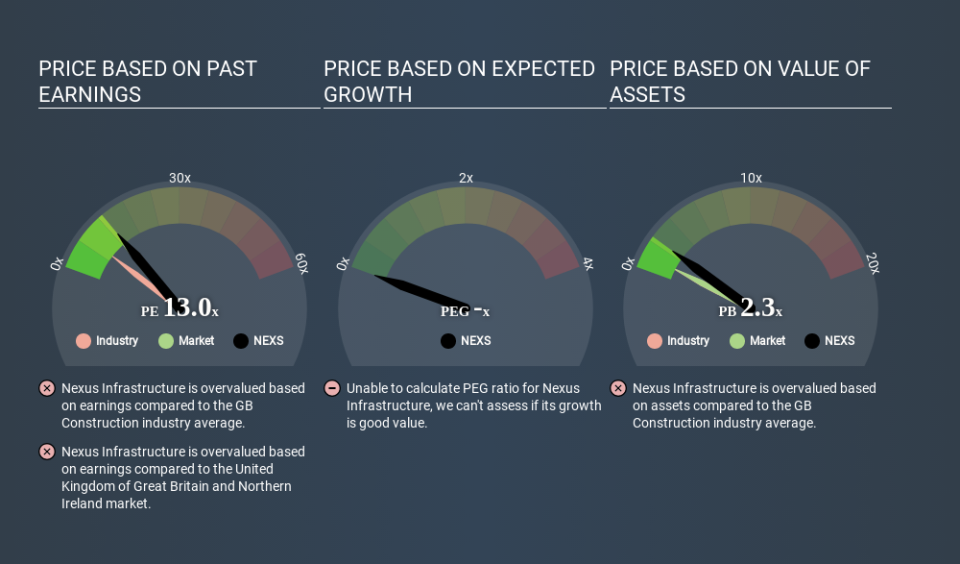How Does Nexus Infrastructure's (LON:NEXS) P/E Compare To Its Industry, After The Share Price Drop?

Unfortunately for some shareholders, the Nexus Infrastructure (LON:NEXS) share price has dived 32% in the last thirty days. That drop has capped off a tough year for shareholders, with the share price down 31% in that time.
All else being equal, a share price drop should make a stock more attractive to potential investors. In the long term, share prices tend to follow earnings per share, but in the short term prices bounce around in response to short term factors (which are not always obvious). The implication here is that long term investors have an opportunity when expectations of a company are too low. One way to gauge market expectations of a stock is to look at its Price to Earnings Ratio (PE Ratio). A high P/E implies that investors have high expectations of what a company can achieve compared to a company with a low P/E ratio.
View our latest analysis for Nexus Infrastructure
Does Nexus Infrastructure Have A Relatively High Or Low P/E For Its Industry?
Nexus Infrastructure's P/E of 13.01 indicates some degree of optimism towards the stock. As you can see below, Nexus Infrastructure has a higher P/E than the average company (7.7) in the construction industry.
Nexus Infrastructure's P/E tells us that market participants think the company will perform better than its industry peers, going forward. Clearly the market expects growth, but it isn't guaranteed. So investors should always consider the P/E ratio alongside other factors, such as whether company directors have been buying shares.
How Growth Rates Impact P/E Ratios
If earnings fall then in the future the 'E' will be lower. That means even if the current P/E is low, it will increase over time if the share price stays flat. Then, a higher P/E might scare off shareholders, pushing the share price down.
Nexus Infrastructure saw earnings per share decrease by 43% last year. And over the longer term (5 years) earnings per share have decreased 3.8% annually. This could justify a pessimistic P/E.
Don't Forget: The P/E Does Not Account For Debt or Bank Deposits
One drawback of using a P/E ratio is that it considers market capitalization, but not the balance sheet. Thus, the metric does not reflect cash or debt held by the company. Theoretically, a business can improve its earnings (and produce a lower P/E in the future) by investing in growth. That means taking on debt (or spending its cash).
Spending on growth might be good or bad a few years later, but the point is that the P/E ratio does not account for the option (or lack thereof).
How Does Nexus Infrastructure's Debt Impact Its P/E Ratio?
With net cash of UK£23m, Nexus Infrastructure has a very strong balance sheet, which may be important for its business. Having said that, at 42% of its market capitalization the cash hoard would contribute towards a higher P/E ratio.
The Verdict On Nexus Infrastructure's P/E Ratio
Nexus Infrastructure trades on a P/E ratio of 13.0, which is fairly close to the GB market average of 12.7. While the lack of recent growth is probably muting optimism, the relatively strong balance sheet will allow the company to weather a storm; so it isn't very surprising to see that it has a P/E ratio close to the market average. Given Nexus Infrastructure's P/E ratio has declined from 19.2 to 13.0 in the last month, we know for sure that the market is significantly less confident about the business today, than it was back then. For those who don't like to trade against momentum, that could be a warning sign, but a contrarian investor might want to take a closer look.
Investors have an opportunity when market expectations about a stock are wrong. If the reality for a company is better than it expects, you can make money by buying and holding for the long term. So this free visual report on analyst forecasts could hold the key to an excellent investment decision.
But note: Nexus Infrastructure may not be the best stock to buy. So take a peek at this free list of interesting companies with strong recent earnings growth (and a P/E ratio below 20).
If you spot an error that warrants correction, please contact the editor at editorial-team@simplywallst.com. This article by Simply Wall St is general in nature. It does not constitute a recommendation to buy or sell any stock, and does not take account of your objectives, or your financial situation. Simply Wall St has no position in the stocks mentioned.
We aim to bring you long-term focused research analysis driven by fundamental data. Note that our analysis may not factor in the latest price-sensitive company announcements or qualitative material. Thank you for reading.

